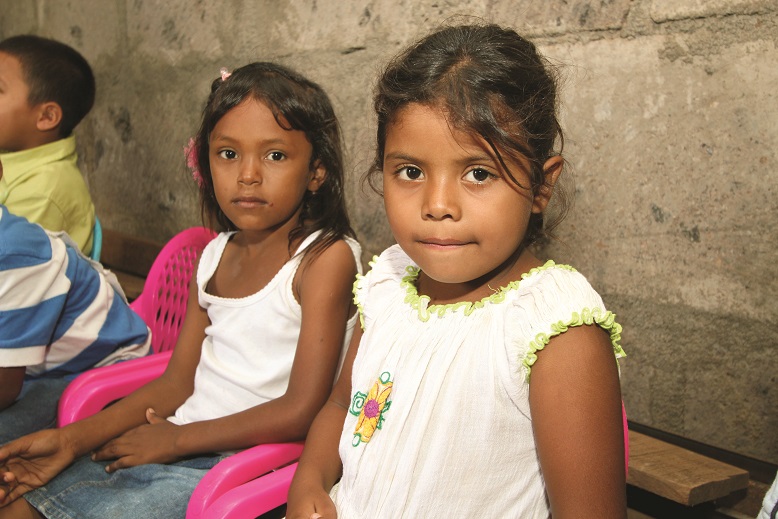Some have been waiting for over an hour under the hot sun that slips through the shade tree. Each child tightly holds the bowl and cup they’ve brought in anticipation of whatever Nelly has in her large fire-blackened pot. It’s not much, but for many of these children, this is the only meal they will get today.
Pastor Valeriano Manzanares started the Rayitos Children Feeding Center in Tangará three years ago, shortly after graduating from ABWE’s Institute for Church Planters, which trains Nicaraguan leaders for ministry. Pastor Valeriano had been pastoring a church in the lower-middle class neighborhood of Oro Verde when God called him to Tangará. While Tangará is less than a mile from Oro Verde, the economic difference is staggering.
Located just west of Nicaragua’s capital along the shore of a heavily polluted lake, Tangará is an impoverished suburb of the densely populated Sandino City. The city is home to a few factories, but it grapples with high unemployment rates, poor infrastructure, and extreme poverty. Historically, Sandino has been a place where the government sends people displaced by the many floods, hurricanes, earthquakes, and other natural disasters that commonly hit Nicaragua. The most recent disaster, Hurricane Mitch in 1998, forced 12,000 new refugees to the city.
“We felt that if we were going to change the situation in the neighborhood, we had to change the next generation.”
With Nicaragua being the poorest Spanish-speaking country in the world and Sandino being one of its poorest cities, the Tangará barrio is at the bottom of the scale, containing the poorest city’s poorest. Unemployment is widespread and many extended families live together to survive. God called Pastor Valeriano to minister to this community of rejected, displaced and destitute people, but despite the ever-present need, he was met with opposition. Gangs harassed him when he tried to establish a ministry near the center of the community. The gangs made it difficult and dangerous for him to be there, but Pastor Valeriano didn’t give up. Instead, he asked God to give him a new church planting strategy and that prayer led him to a new vision.
“Upon seeing the hardness of the hearts of the adults, we decided to start making inroads with the community through a children’s ministry. We felt that if we were going to change the situation in the neighborhood, we had to change the next generation,” said Pastor Valeriano. “We shifted our focus to a feeding center for kids, and God began opening up the doors.”
Shining Light Into The Darkness
With the help of his ABWE mentors, Pastor Valeriano opened the Rayitos Children Feeding Center on the edge of the Tangará barrio. Rayitos means “little rays of light” and alludes to the center’s mission to bring little rays of light to this dark area. The program originally ran only on Saturdays, but was quickly expanded to include Thursdays and Fridays when Pastor Valeriano realized it was difficult to affect nutrition unless the children received a complete meal several times a week.
“All of the land is dirt. There is no grass. The kids sit on benches made from old pallets. But to us it is beautiful.”
Initially, Rayitos operated out of the house of one of Pastor Valeriano’s church members who lived in Tangará, and Nelly, a loving church woman in her 50s, started doing all of the cooking on an outdoor stove behind the house. The kids met on benches on the front patio, and a small overhang and a tiny tree provided the only shade and protection from rain. There was not much space for the kids, and as word spread, the number of kids coming through Nelly’s line grew beyond the home’s capacity.
Pastor Valeriano, along with ABWE missionaries Mark and Jen Holsinger, began to seek a more permanent location, and in May 2014, God provided the funding for the ministry to purchase its own property. It was still small, but it included a little cement-block house, shanty kitchen, latrine, and three large trees that provided sufficient shade for all the kids. Nelly did the best she could in the makeshift kitchen, until Pastor Valeriano raised enough donations from churches and supporters to build a new kitchen and bathrooms. Now, Rayitos has a large kitchen with a new roof to keep out the rain and sun, cement and tile counters for chopping and preparing food, a refrigerator and cabinet to store food and supplies, and a large gas stove for Nelly to cook on.
“We are so thankful for this blessing,” said Mark Holsinger. “To visitors the property probably still looks bare and in need of a lot of work. The front wall and gate are made of rusted corrugated tin. The small house is dingy and old and full of supplies, building materials, and a hammock for the caretaker. All of the land is dirt. There is no grass. The kids sit on benches made from old pallets. But to us it is beautiful.”
Precious Manna
Every day Rayitos is open, Nelly can be found cooking over the hot stove and lugging huge pots for the large portions. Attendance fluctuates throughout the year, but on average, Nelly dishes out food for more than 120 kids varying in age from babies to teenagers. They normally receive a drink, rice with soy, pureed potatoes or pasta, and part of a tortilla, which serves as a spoon. Some eat on the benches, but many take it home to share with other family members.
“Food is precious in Tangará,” said Mark. “We are amazed at how little food is spilled even by the little ones.”
Getting the bare necessities of life is a struggle for most families in the barrio, and they often don’t have enough to eat. Most eat meager portions of rice and beans for almost every meal, and vegetables and meat are a rare luxury.
“We hosted a day camp where we took a group of children to the ABWE ministry center. For lunch, we served fried chicken and some of the younger kids did not know what it was,” said Mark. “Most of the kids ate little of the chicken and wrapped it up in napkins to take back to their family. They even wrapped up the bones to take home.”
Daily Bread
While the center is nourishing these children’s bodies, it is also nourishing their souls. Before lunch is served, Pastor Valeriano and the Holsingers lead the children in a time of worship, prayer and Bible study. They begin each session with prayer, and they teach the children how to pray by saying the prayer one line at a time and having the kids repeat after them. Then, they have a time of song and worship, followed by a Bible lesson. Many of the kids need help finding the books of the Bible and the verses, but they are learning. Currently, the Bibles are kept at the center, but Pastor Valeriano hopes to develop a system where children can earn their own Bible through verse memorization and faithful attendance.
“At first, the kids come for the food. Then, they come because of relationships they form with the teachers and other workers. We hope, as they grow, they will also come because of their love for God, His Word, and worship of Him,” said Mark. “This is our hope.”
Before the children are released to go through the food line, Pastor Valeriano does something that some might find odd in a neighborhood where the families have so little — he passes around a plastic bag for the children to give an offering. He does this every time they feed the children to teach them the importance of giving — no matter how little they have. Some give nothing and some give a córdoba (worth about four cents), but Pastor Valeriano hopes to show them how God takes the little that they give and multiplies it.
“We have already seen God multiply this ministry and bless us in so many ways. We have seen a change in the attitude of the children. We have seen an acceptance of the Word of God. We have seen kids memorizing verses. We have seen the attendance increasing. And we have seen kids accepting Christ as their savior,” said Pastor Valeriano. “And recently, we saw the first adult come to Christ.”
Leticia was a young mother in her early twenties who started coming to the feeding center with her little baby and her younger brother. Each week, she watched the Rayitos staff care for her child and the Tangará children who were starving to be loved and nurtured. She heard Pastor Valeriano and other teachers talk about a loving God who sent His only Son to die for her. While her baby could not understand the lessons, Leticia could, and timidly, she began participating. She even memorized the Bible verses. Then one day, as the children were receiving their food after the lesson, she sat down with Pastor Valeriano and asked him to help her accept Christ. Leticia is now attending the adult Sunday school class, and the beginning of what Pastor Valeriano and the Holsingers hope will grow into a new church plant.
“We are thankful to all the people who have helped our ministry because of their love for Christ. God has provided the money necessary for this ministry and now we are praying to expand its reach so we can impact more hearts in Tangará,” said Pastor Valeriano.





